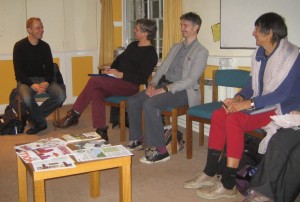 How can mediaeval England give us a perspective on modern global capitalism? For Nick Dearden, new WDM director, the ancient concept of the commons still has resonance today. At the November meeting of Oxford WDM, he said that the commons is “a way of looking at our world”. So what did he mean by that?
How can mediaeval England give us a perspective on modern global capitalism? For Nick Dearden, new WDM director, the ancient concept of the commons still has resonance today. At the November meeting of Oxford WDM, he said that the commons is “a way of looking at our world”. So what did he mean by that?
In the Middle Ages the term “commons” was applied to land that local people had a right to use. The “enclosures” of Tudor times put an end to these traditional rights, turning commons land into land that was solely for the use of the owner. There were riots in response, with a corresponding crackdown – and Nick believes that “the violent process of enclosures is important for understanding today.”
Clean air. Water. Forests. Wildlife. All things we have a right to enjoy, without necessarily owning them. In other words, they’re part of a global commons. But like the mediaeval commons, they’re under threat. The argument from many governments goes something like this:
We’re not looking after the planet properly… (True)
and this is because we don’t value it enough… (Well, maybe)
so we need to put an actual financial price on it. (Whoa there!).
The idea appeared in reports of the the Rio+20 Earth Summit last year; and has gained ground (excuse the pun) since then. The first ever World Forum on Natural Capital took place a few weeks ago, with the starting point that resources such as soil, fresh air, disease resistance and water quality are “natural capital”, ripe for being priced up. It was attended by such well-known nature-lovers as Nestle, Scottish Power and Rio Tinto. A full corporate pass for the event was £800 (including dinner) or £700 (excluding dinner). In other words, we’re having our natural resources priced up by people who think £100 is a reasonable price for an evening meal.
Nick Dearden argues that this mindset is becoming pervasive. One of the more damaging effects of tuition fees has been to give students a different view of education. “People are encouraged to think of life as an investment account. The enclosures are happening inside our heads.” Ditto NHS patients being encouraged to think of themselves as customers, food growers being encouraged to think of their crop as a commodity. It’s an attitude that activists need to challenge, but the first step is becoming aware of it.
Most of those present had something to contribute to a wide-ranging discussion, which also covered growing inequality, an issue sometimes obscured by the smokescreen of debt. Nick notes that 95% of the wealth generated since the financial crash has gone to the wealthiest 1%. Meanwhile, the Red Cross report on Europe warns of “soaring inequality” and trouble being stored up for the future, while NGOs are becoming increasingly conservative, focusing on aid rather than root causes.
So what do we do next? “The idea that there’s no alternative has got deep inside us.” We don’t have to have our ideal world mapped out down to the design of the sewer systems – we just have to challenge the orthodoxy that the current situation is the only possible one. We need to challenge the idea that political involvement is about “tweaking”, making small surface changes. We know there are movements bubbling under the surface in Latin America – could the same be happening in countries such as Greece?
Nick ended his talk on an upbeat note: however grim things might seem, he’s certain that “the world would be a much, much worse place without activists.”

Leave a Reply